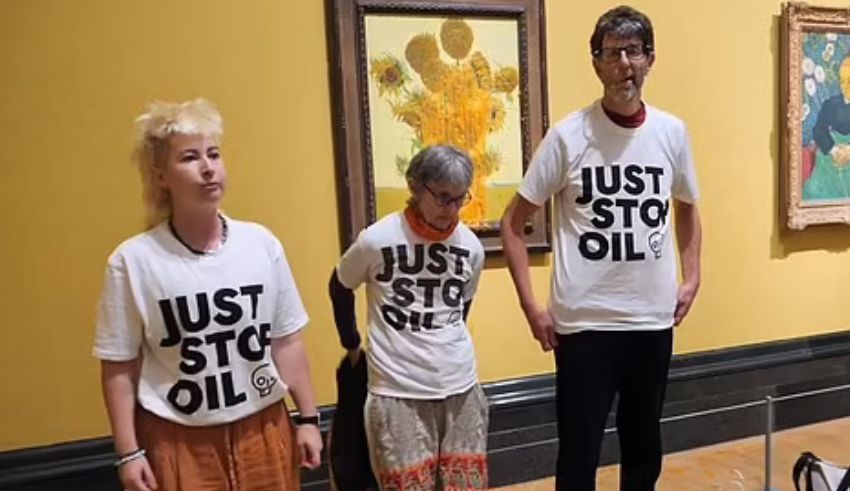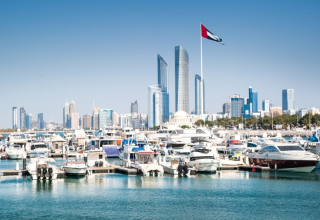
On Friday at London’s National Gallery, three Just Stop Oil (JSO) activists performed a stunning and symbolic act of protest by throwing a soup-like material upon two of Vincent van Gogh’s famed Sunflowers. The event occurred mere hours after two other JSO activists were imprisoned for planning a similar demonstration using the same artwork two years prior, therefore signaling the most recent phase in a series of provocative events aimed to draw attention to the urgent issue of climate change.
The gallery confirmed that the paintings shown in this exhibition were two masterpieces from Van Gogh’s renowned series, Sunflowers, from 1888 and 1889, which have delighted art lovers all across. Shortly after the incident, all three of the involved individuals were taken into custody.
Just Stop Oil: Continual Environmental Action Campaign
Renowned for its disruptive operations, environmental group Just Stop Oil has drawn a lot of interest recently for its aggressive strategies. The group wants countries and companies to stop using and mining fossil fuels, which they say are pushing the planet toward catastrophic climate collapse. Frequent targets of emblems of social and cultural value, their actions have sparked conversation about the tactics used in the fight against climate change.
This most recent demonstration followed a court ruling earlier in the day when two JSO activists Anna Holland, 22, and Phoebe Plummer, 23 were sentenced to prison for a comparable action in October 2022. Though the artwork itself was undamaged, the couple had poured tomato soup at Van Gogh’s Sunflowers (1888), severely damaging the picture’s protective frame around £10,000 ($13,420). Plummer received a two-year sentence; Holland served twenty months. Both had filed not guilty under criminal damage allegations.
Legal and Public Reactions: Partisan Issue
The punishment of Plummer and Holland garnered a lot of public interest and produced somewhat varied impressions. Judge Christopher Hehir said the artwork might have been “seriously damaged or even destroyed” and scolded the protestors in court for their reckless behavior. Hehir stressed that their belief in the cause did not give them the right to commit acts of vandalism, therefore disregarding the activists’ assertion that their actions were justified by their views. “You had no right to do what you did to Sunflowers,” he remarked.
Declining claims that the activists were political prisoners, he also labeled the concept as “lasant, offensive, and idiotic.” Notwithstanding this, supporters of the campaigners gathered outside Southwark Crown Court bearing posters identifying them as “political prisoners” and underlining their view that aggressive action is needed to fight for a sustainable future.
Will McCallum, co-executive director of Greenpeace UK, said the punishment was “draconian and disproportionate” and criticized the jail terms. He claimed the penalties were only another proof of the escalating crackdown on peaceful protest. “Protest is by nature awkward and occasionally messy,” McCallum remarked. ” These defendants do not deserve to spend years behind bars for standing up for a liveable planet.”
Soup, Sunflowers, and Symbolism: Direction of Future Activism
Friday’s presentation reflects the ongoing public and legislative response to Just Stop Oil’s well-publicized assault to the current quo. J SO confirmed as Phil Green, 24, Ludi Simpson, 71, and Mary Patricia Somerville, 77 the three activists behind the most recent soup attack on the Van Gogh paintings. Simpson said after their arrest, “We will be held accountable for our actions today, and we will face the full force of the law.” She then shifted the focus to what she thinks to be the real crime and asked, “When will the fossil fuel executives and the politicians they have bought be held accountable for the criminal damage they are imposing on every living thing?”
This speech highlights the immense frustration and urgency felt by climate activists who claim that businesses and world leaders are not acting sufficient to prevent environmental calamity. Targeting art, particularly treasured cultural treasures like Van Gogh’s Sunflowers, is aimed to inspire fury and draw attention to the front and center of public debate on the climate disaster. Activists claim that extreme measures are necessary to inspire people to the scope of the problem.
National Gallery Climate Activism: A Troubled History
The National Gallery has become unintentionally a battlefield for the climate movement. Apart from the two Sunflowers events, the gallery has seen several rallies by environmental activists in prior years. Other pillar of British art history in July 2022, The Hay Wain, members of Just Stop Oil adhesively themselves to John Constable. Like the others, the incident spurred debate on the propriety and force of challenging cultural icons in the fight for environmental justice.
Reacting swiftly to Friday’s tragedy, the gallery confirmed via conservator inspection that both of the Sunflowers paintings were undamaged. The gallery added, trying to reassure the public while also limiting the interruption caused by the protest: “We are aiming to reopen the exhibition as soon as possible”.
An All Around More General Crackdown on Climate Protest
This most current episode takes place inside a bigger UK crackdown on disruptive climate action. Authorities have been increasingly hostile against protest groups like Just Stop Oil as several well-known activists serve lengthy jail terms. Five organization members—including its founder—were found guilty in June 2023 to four to five years in prison for planning demonstrations that impeded the M25 highway, a main artery of transit surrounding London.
Apart from new laws aimed to curb disruptive protests, the British government has also implemented more stringent procedures meant to limit the influence of demonstrations. While supporters argue these actions are necessary to prevent anarchy and maintain public order, others argue they limit civil freedoms and the ability to protest.
Ahead: Climate Protests?
As the crisis gets worse, the activism meant to solve it gets more forceful. Legal consequences notwithstanding, organizations like Just Stop Oil never waver in their push for radical changes in the way society consumes fossil fuels. Though their strategies could be polarizing, the campaigners are stressing the seriousness of the climate catastrophe and advocating difficult conversations about the required sacrifices to stop environmental collapse.
Notwithstanding the arrests, events like the one held at the National Gallery are most likely to continue. Just Stop Oil’s most recent performance highlights the degree some activists are willing to go to demand action and draw attention. Whether such tactics will be effective in influencing public policy or lead more severe crackdowns is still to be seen. The debate over the boundary between protest and vandalism and the ethics of messing with cultural artifacts continues burning for now as the world battles with the growing threat of climate change.
























